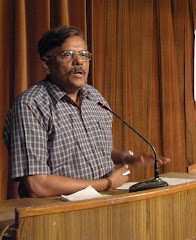
Violence and the Uncanny in Vibhuti Narain Rai's Curfew in the City
Speaker: Dr.Bede T. Scott
Date: Wednesday, 24 October 2007Time: 4.00 pm
Venue: AS5/05-09
Abstract:
This paper examines the phenomenon of communal violence on the Indian subcontinent -
exploring its impact on urban space and on the status and disposition of the minorities inhabiting that space. Through an analysis of Vibhuti Narain Rai's 1988 novel Curfew in the City - set during the Allahabad riots of 1980 - I argue that such violence serves to reconfigure urban space along sectarian lines, framing and reframing the topographical boundaries between communities. Muslim districs become 'mini-Pakistans', wire fences become the Line of Control dividintg the two Kashmirs, and open drains become the Indo-Pakista ni border. I then explore the adverse impact this reconfiguration of space has on minority communities, alienating them from their environment and inducing in them a profound sense of displacement or 'unbelonging'. In order to clarify this process, I shall be employing the psychoanalytical concept of the uncanny, or unheimlich - Freud's term for 'everything . . . that ought to have remained secret and hidden but has come to light'. In this instance, however, I use it to describe the way in which communal violence 'defamiliarizes' urban topography - translating the familiar into the unfamiliar, the homely into the unhomely - and in so doing, converts persecuted
minorities into symbolic foreigners or refugees-in-waiting. As James Clifford points out, displacement does not always require movement; it can also 'involve forces that pass powerfully through - television, radio, tourists, commodities, armies'. A list to which I would add that most powerful of displacing forces, the communal riot.
About the Speaker: Bede Scott is an Assistant Professor in the Division of English, Nanyang Technological University. He completed his PhD at the University of Cambridge in 2006.
ALL ARE WELCOME






































1 comment:
I am glad to gain this worthwhile information here. Your strategy of deciphering your valuable thoughts here among us is appreciated. Keep up with this praiseworthy work. One can speak and practice English in an effective way, just by downloading English Learning App on your own smartphone, which you can use whenever and wherever you want to practice your communication skills with experts.
Practice English app | English Speaking App
Post a Comment